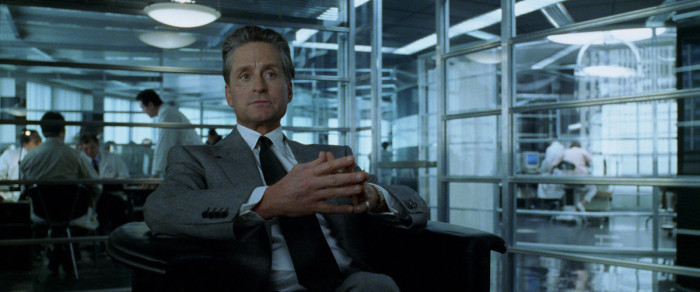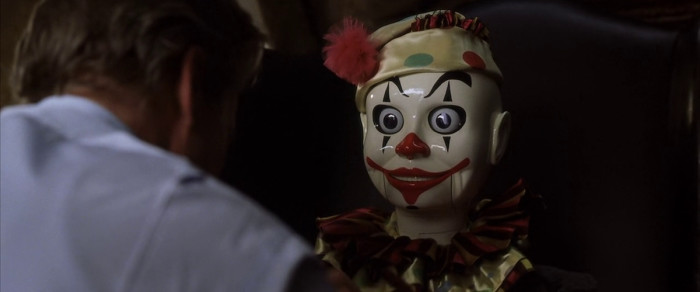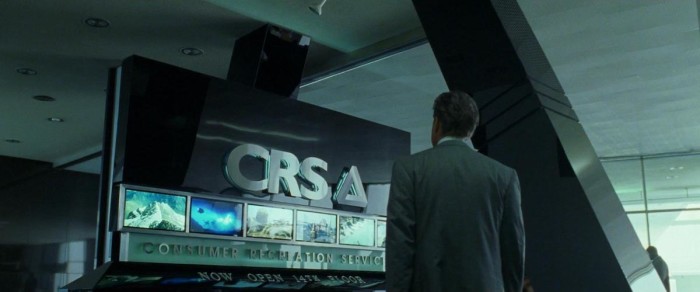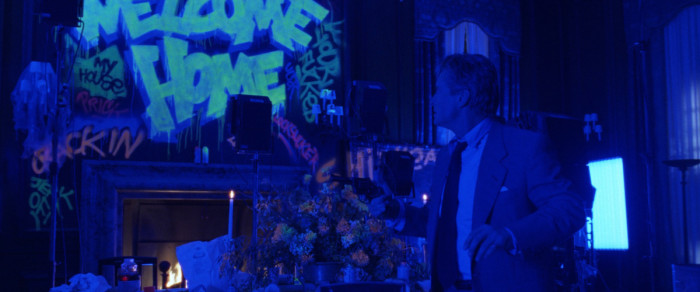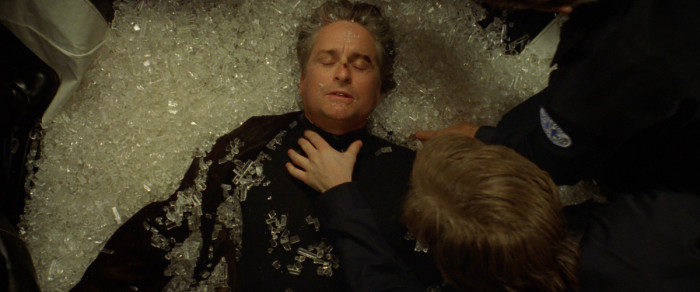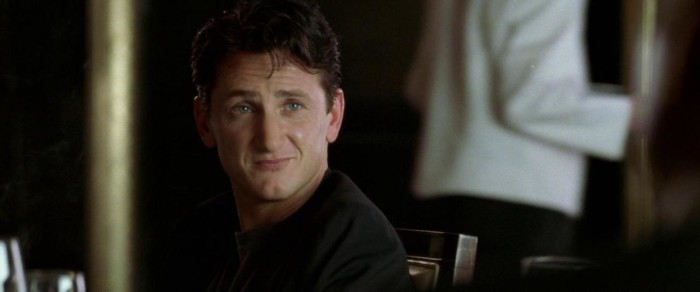Playing 'The Game' On Its 20th Anniversary - David Fincher's 1997 Film Still Holds Up
More than any other mainstream filmmaker, David Fincher is the one who has had his finger on the pulse of our generational concerns. If you Google Fincher's name and the word "zeitgeist," it will immediately turn up countless think pieces talking about how his films — especially Fight Club and The Social Network — have captured the zeitgeist, reflecting the spirit of their time the way The Graduate did for the 1960s.
But The Game, Fincher's 1997 thriller starring Michael Douglas, was a necessary primer for Fight Club. With this film, Fincher took the actor who played Gordon Gekko ten years earlier, and he gave that '80s zeitgeist figure a light makeover and put him in a post-grunge '90s movie.
The Game turns 20 today (it hit theaters on September 12, 1997), so let's take a look back at what makes it so special: not only for the way it marked a turning point in Fincher's early career, but also for the way it takes a high-concept story and manages to bake in a fair amount of subtext.
Wall Street Sequel, Fight Club Prequel
In The Game, Michael Douglas plays Nicholas Van Orton, an investment banker whose pampered existence makes him the ideal candidate for a little life shake-up. That shake-up comes courtesy of a gift from his estranged brother, Conrad, played by Sean Penn. As a birthday present, Conrad gives Nicholas a gift certificate for a company called Consumer Recreation Services (CRS). This company specializes in a mysterious real-world game that is "specifically tailored for each participant."
What is the game? The CRS representative bills it as "an experiential book-of-the-month club." Conrad calls it "a profound life experience." Tyler Durden would call it "a near-life experience."
That is not a random comparison, either. If you think about it, Nicholas and the nameless Narrator of Fight Club undergo somewhat similar journeys. Both of them are looped into an existential sport that liberates them from their humdrum workaday lives. Along the way, they both endure car crashes, and they both find themselves in the back of vehicles in parking garages, at the mercy of powerful forces (one external, the other internal).
Both of them are outsiders, too. Nicholas takes satisfaction in avoiding "society," whereas the Narrator seems content to lurk on the fringe in support groups.
It is primarily social class that separates these two characters. Nicholas is all business: he appears to be a workaholic with no private life outside his mansion and solitary racquetball games. Among the trappings of wealth that he enjoys are $2,000-dollar shoes. Fight Club's Narrator, on the other hand, is more a slave to the grind, who seeks to justify his existence as an office drone with purchases from the Ikea catalog.
In short, Nicholas represents the 1%, and the Narrator represents the 99%. That is part of what makes the Narrator so much more relatable, because he is an everyman. The once all-important demographic of 18-to-34-year-old males, middle-class and working-class types, could identify with him strongly, even as some of them (yep, guilty as charged) seemingly missed the point of what he went through and went about building a nest of DVDs in the 2000s. "I am Jack's 2-disc Special Edition."
For his part, Nicholas was perhaps never meant to be relatable. Before Money Never Sleeps, it was left to The Game to function as a pseudo-sequel to Wall Street, Oliver Stone's portrait of greed run amok in the 1980s. Hollywood has often portrayed that decade as a gilded age when the new rich, fueled by cocaine and other forms of excess like speedboats, thrived on irresponsibility and self-interest. Enter Gordon Gekko, Stone's paragon of amorality, the oily stockbroker sporting slicked-back hair and suspenders, who was just looking to make a quick buck at the expense of a few other people.
Nicholas Van Orton lacks the swagger of Gordon Gekko, but he is every bit as ruthless, willing to cast aside human relationships, even ones cultivated over long years, such as Anson Baer, his father's friend and business associate. Haunted by the suicide of his father, Nicholas finds a harlequin doll in his driveway, in the same spot where his father landed when he jumped from the roof of their mansion. Scary clown? Check.
Hauling the clown into his living room, ignorant of the secrets that lurk behind its creepy doll eyes, his inspection of it is interrupted when the face of a newscaster on television breaks the fourth wall and starts talking to him directly, taunting him as a "bloated millionaire fatcat." So begins the repudiation of Gordon Gekko's legacy.
Fincher undoubtedly knew what he was doing when he cast the same actor with the same indelible Wall Street associations to play the main character in The Game. Just as grunge music tore down the house that hair metal built (in The Wrestler, Mickey Rourke's character lays the blame squarely at the feet of Kurt Cobain), CRS would set about dismantling the comfortable life of Nicholas Van Orton, defacing his home with black-lit graffiti and just generally toying with him "like a bunch of depraved children" (a.k.a. Gen-Xers, slackers, Fight Club's "middle children of history.")
Consumer Recreation Services exists in The Game as a spiritual prototype for Project Mayhem. In 1999, that black-lit graffiti would go large and become the burning green smiley face on the side of a building. The same restlessness, the same dissatisfaction with modern materialism, all those heady, pre-millennial concerns that would find their way into Fight Club, are already on display in The Game. The film's slinking sense of unease is that of a whole values system knowing its time is up. And so even as The Game acts as a pseudo-sequel to Wall Street, it simultaneously acts as a quasi-prequel to Fight Club, bridging the two zeitgeist films, providing connective tissue between them.
As much as Fincher's films are a part of pop culture, there is also a sense in which some of them seek to destabilize the very culture that spawned them. A consumerist culture, driven by recreation, would be ably served by Consumer Recreation Services. The Game is just a movie, after all. Like Panic Room, it's a Saturday night flick for the popcorn crowd. Yet if you dig into it, it's a piece of entertainment that manages to hack the viewer's conscience, as well, sneaking some undeniable themes in through its twisty plot.
In this film, the same face that declared, "Greed is good," would be put through the wringer till he was saying, "I don't care about money." Nice bit of foreshadowing for the sight of credit card buildings being demolished as "Where Is My Mind?" by The Pixies started playing and the credits on the 20th century rolled.
Fincher’s Game and the Millennium Bug
Members in the lounge of Nicholas' racquetball club ascribe an almost religious significance to CRS's game. "What is it?" Nicholas asks again. "The eternal question," answers one member, sounding almost like he is talking about the mystery of life itself. He even quotes Bible verse: "Whereas once I was blind, now I can see."
As he has a conversation with his television, trying to ferret out the meaning of this elaborate prank that is being pulled on him, Nicholas receives the number for the CRS emergency hotline. But the talking head on TV tells him, "Don't call asking what the object of the game is. Figuring that out is the object of the game."
Fueled, perhaps, by Y2K paranoia, there were a number of films that came out toward the end of the last century where the plot was built around a central character questioning the nature of their reality. In a sense, the Millennium Bug was not limited to computers, as there seemed to be a bug in the collective unconscious, as well. In the same way that The Game functions as a precursor to Fight Club, it might also be viewed as a precursor to films like Dark City (1998), The Matrix (1999), and Existenz (1999).
Apart from this, through the prism of Fincher's filmography, The Game is an important film, because it further redeemed him critically, continuing the course-correction for his career that was started by Seven after the disappointing false start of Alien 3. In a way, given the level of studio interference in Alien 3, The Game could almost be viewed as Fincher's true sophomore effort. Yet it eschews the sophomore slump syndrome and finds him operating at the height of his mid-to-late '90s creative powers. If Seven served to announce Fincher, establishing his voice as a visionary filmmaker, The Game would show that film was not a one-off, solidifying the former music video director as a potential top-tier auteur. Which of course, Fight Club and later films like Zodiac only proved that he was.
Though his consciousness never leaves reality the same way that Neo's does in The Matrix, the lines between the real world and the game do get blurred for Nicholas Van Orton, and he spends the movie waking up to two truths: the truth behind the lie of the game, and the truth behind the lie of his life, which has been built on the unsteady foundation of material gain. For people who came of age in the 1990s, this awakening, and indeed Fincher's whole rise as a director, would maybe coincide with a new identity being found, in both a personal sense, and in a broader sense, in the way the culture at large was changing.
It can be fun to wax nostalgic on anniversaries, so at the risk of going off on a wayward tangent, let's unplug from the Matrix for a second, and take a look back at the real world of 1997, through the eyes of one high-schooler.
Outside The Game, in the Life of a Late ‘90s Juvenile Delinquent
On a personal note, The Game is one of a handful of movies that helped make going to the movies a more regular thing for me back in high school. A friend of mine had attended a special night premiere, and I remember being regaled as he told me about how the local alternative radio station was there, firing T-shirts out into the audience. Going to the movies suddenly seemed like such a cool event that I was missing out on.
When I sat down to watch the movie myself, and saw the previews that played before it, The Game helped set off a trashy yet fun film renaissance in my life. In late '97, I started hitting up the theater more often to see any new movie that looked marginally interesting. Films like The Edge, U-Turn, and The Devil's Advocate fell under this banner. Since I was under 17, I would just have to buy a ticket for a G-rated movie and then sneak into the one I wanted if I got carded at the box office window. That year, I had enrolled in Journalism class at school, and when not abusing my press pass to roam the halls freely, I remember taking a notepad to the local 8-screen so I could write a review of The Rainmaker for my school newspaper. Back then, we were still pasting the newspaper flats together by hand before shipping them off to the presses.
At the same time, I had also begun skipping school. It's a wonder I didn't get busted for truancy by a patrol car the day I went to see Wag the Dog during school hours. Yet if I was worried about getting caught, I could always just stay home and watch other R-rated movies, since I had used my effeminate young voice to fake my mother's voice over the phone and get the youth restriction lifted from her Blockbuster Video account.
Alternative music, local 8-screens, hand-pasted newspaper flats, Blockbuster Video. The world has changed a lot since then.
20 years later, the basketball gym at my high school has just spent the weekend serving as a hurricane shelter. Disasters, natural and otherwise, have a way of putting things in perspective. So on its 20th anniversary — the week of Hurricane Irma, the day after the 16th anniversary of 9/11 — it is impossible to watch a movie like The Game and not think, to some extent, about what really matters in life.
As I rewatched the film this week, while worrying over family and friends in Florida, the ending of The Game actually made my eyes water — not because of the personal connection I have with the movie, but because of the film's underlying message, or what I perceived that to be. While a popcorn muncher might just want to enjoy this movie as entertainment for entertainment's sake, and an art-lover might just want to enjoy it as art for art's sake (without hearing some pesky analyst reduce the movie to a moral), I do think there is a certain moral to be found in this story. Let's end by talking about what that might be.
The Christmas Carol Connection
Current events in the real world may be coloring my perception of this movie, over and above the way I would have already been predisposed to look back on it through rose-colored glasses as one of the movies of my youth. But if The Game can be seen as "a postmodern version of A Christmas Carol" (as Fincher himself described it), then I really believe this film has a useful subtext.
Recognizing that subtext may be partly contingent upon knowing the film's ending. So even though this film is now 20 years old, and the statute of limitations for spoiling it may have run out, if you have not seen The Game, go watch it now, before these forthcoming spoilers ruin it for you.
Wikipedia defines catharsis as "the purification and purgation of emotions — particularly pity and fear — through art or any extreme change in emotion that results in renewal and restoration." Nicholas Van Orton certainly undergoes an extreme change in emotion like that at the end of The Game. As he takes a suicidal leap from a rooftop and comes crashing down through the skylight of another building, the character sees images from his childhood. That he lands on an inflatable stunt bag in a ballroom full of familiar faces, people who care about him, might be seen as a narrative cop-out, something that strains credulity.
Creators aren't always the best judge of their own work, but for what it's worth, Fincher himself now seems to regard The Game as having third-act problems. Because of course, real life doesn't always offer a safety cushion like that to break our fall. Still, in his commentary for the Criterion Collection's Blu-Ray edition of The Game, Fincher said, "This isn't a movie about real life. It's a movie about movies."
The moment he crashes through that skylight — all throughout the film, perhaps — Nicholas Van Orton can be seen as an audience stand-in. He may not be relatable from a socio-economic standpoint, but you could probably write a whole essay about the way his character interacts with the plot, and how it frames him as a surrogate for filmgoers that way. CRS is basically a movie studio, complete with a commissary full of actors. It stages the production of its "game" just for him, just for us, making us jump through numerous narrative hoops so we can feel something.
By the end, the movie has led us on a merry chase, trapping us in the back of a runaway taxi cab and in the middle of other tense situations with Nicholas. It has stripped the investment banker of his vanity, turning him into a literal dumpster diver, before entombing him alive in Mexico with nothing but his father's personally engraved wristwatch to use for bartering. Pretty soon, the same major-league asshole who was unwilling to play the good Samaritan and pass toilet paper to a guy in a bathroom stall would be forced, himself, to wander into a diner in a dirty white suit and beg for a ride from anyone who would listen.
Nicholas comes out the other side of these humbling experiences a better person, more of a real human being, with a new lease on life. Suddenly the rich prick is now a little nicer to others. And in the time-honored tradition of Ebenezer Scrooge, maybe the audience can take something away from that.
Filmed in dark and steely tones, The Game has a chilliness to it, which might give it too much emotional distance for some. But under its cold skin, there lurks the beating heart of a humanist perspective, however wry and weary it might be. This is evident in the way composer Howard Shore's score for the film invites us in with its somber piano cue, a lonely cocktail-lounge melody for a 48-year-old named Nicholas (who is no saint, but who will come to appreciate the spirit of Christmas, in this Christmas movie that is not a Christmas movie).
In spite of himself, and whatever other interpretation he might hold, Fincher did manage 20 years ago to craft a movie with multiple layers to pick apart. One of those layers is the Christmas Carol layer. To that end, The Game does have some application to real life.
This is probably one of the few Fincher films that is not immediately guaranteed to leave a person feeling bad at the end. Art can be therapeutic, and in its own dark, devilish way, The Game offers catharsis and a reminder of what's truly important in life. Call it mere escapism – taking the blue pill instead of the red one, staying inside the Matrix – but in 2017, that feels like a nice antidote to some of the other things going on in the world right now.

